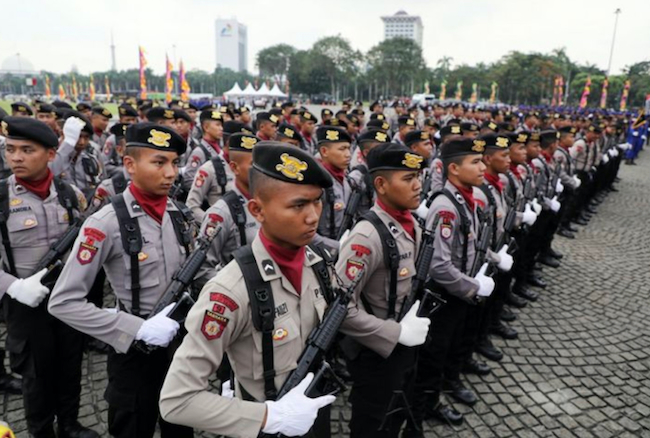An interview with Sana Jaffrey
Sana Jaffrey is one of the leading experts on vigilantism in Indonesia. Her research spans a range of contexts throughout Indonesia; from urban Jakarta to Lombok, Poso and Aceh. Her research methods are both qualitative and quantitative and are founded on in-depth interviews and solid contextual knowledge. In this interview with Andy Fuller she describes the trajectory of her research and also outlines her argument about vigilantes are able to ‘leverage the state’ to do their bidding.
Andy Fuller: I’m wondering if we could start by touching on the link between vigilantism and religion.
Sana Jaffrey: So, everyone remembers the Ahok incident, right? The big blasphemy case. So, following that, Riziek Shihab was sent into exile on this case about sexual misconduct. Pornography case, I think it was. After this there was this whole idea of ‘insulting the ulama’, right? There were a few very high-profile cases of people who were critical of Riziek Shihab – in fact, people were making fun of him. ‘Oh, he’s like this religious leader, but look at what he is doing?’ They were putting these memes on social media et cetera.
This whole thing happened for almost a year – from about 2017. A pattern emerged where the Front Pembela Islam (Islamic Defenders Front, FPI) would find these people through deploying their ‘cyber troops’. They would hunt down the people who had ‘blasphemed’ Islam. They would find them, threaten them, and harass them. Then, they would make them apologise. People would have to make apologies that they had done something wrong and that they wouldn’t do it again. These apologies were recorded and circulated to spread the terror amongst others who might be thinking of doing the same thing. So, the idea was, ‘if you do this, we consider this blasphemy. An insult to Riziek Shihab is an insult to Islam. We’re going to come find you and then you will have to go through this ordeal.’
AF: In talking about ‘Islam’ in post-New Order Indonesia it’s very hard not to mention FPI at some point. It’s like they exemplify something markedly different between the 2000s and earlier. So, what’s your take on the emergence and notoriety of FPI?
SJ: The general response from the public was along the lines of ‘there is no state’, ‘negara tidak hadir’ or ‘the police aren’t doing their job’. That sort of idea. Then, I followed up on some of these cases and found that, in each individual case the police were actually present. In fact, the police were doing the job of convincing the victim: ‘you should really sign this apology otherwise we cannot protect you.’
There was one case in West Sumatra where a doctor had made comments that were taken as insulting and offensive. She had to take her children and run. She had to come to Jakarta to escape the harassment that she was facing from the FPI guys. But what was interesting was the role of the local police chief in coercing her into an apology. The only way that she was being helped was by signing multiple apologies. The documents that she had to sign had the official materei (stamp) of the local police chief as a witnesser, an endorser.
The officials are present in these situations where the vigilantes are doing their bidding, and they can convince the victim that their fate is going to be much worse if they don’t sign the apology because somebody in a uniform is telling you that they can’t protect you. They don’t really have much of a choice, right? People who are victims of vigilantism are caught between issuing an apology to vigilante groups like FPI or saying no and facing violence or facing the threat of legal persecution by the police, where the police would say, ‘if you don’t apologise, we will have to register a case against you. Then you will be going back and forth to the court to prove that you are not guilty.’ And so, in these cases the vigilantes are gaining strength from the police who are there to intimidate the victims even more.
AF: I’m also curious about your take on security and insecurity. What are the kinds of things that people feel insecure about? This could hint us towards the role of religious organisations which also provide security.
SJ: It varies a lot by location as you can imagine. Some of the discussions I had with informants were about actual security, but most of it was about the apprehensions people have, or their anxieties. People were anxious about change, and perceiving strangers. So, you know, for example, what I noticed in Jakarta and in the suburbs such as Tangerang, Bekasi, areas that were rapidly industrialising areas, there were a lot of new workers coming in and out. In these rapidly industrialising areas one thing I heard again and again was ‘back in the day, if someone was coming to our kampung, we would know who he is. They would say hello to us. They would introduce themselves. Nowadays, people just sit around – and we don’t even know who they are.’ So, there was this idea of uncertainty about new people coming in and undoing the ways in which things were done and challenging authority. A lot of these discussions framed people of certain ethnicities or those who came from different regions as being particularly prone to being criminals.

AF: What is the presence of religion in your analysis?
SJ: I think a lot of the public attention is focused on vigilantes that have a religious purpose. FPI has been such a big part of the discussion and rightly so because they have been violent and also because of their relationship with the state has been hot and cold over time. But what I have found is that they’re trying to achieve their national, political agenda by acting on local templates that have widespread legitimacy. The kinds of things FPI were saying when they were justifying vigilantism against these people who were saying bad things about Riziek Shihab, and they were being criticised by the public. They were saying, ‘you might not like it, but can you take the law into your own hands?’ And FPI responded by constantly referring to vigilantism against thieves to justify their actions. They would say, for example, ‘what do you mean? If a thief comes into your home and does you wrong, do you act or do you want the police to come?’ ‘How can you fault us for doing the same thing?’ This was a systematic thread of using a template of violence that has widespread legitimacy in a broad section of the public and using that to justify their own violence for their own political means.
So, I don’t think vigilantism is increasingly religious. In my research I didn’t find that people who are extra-religious, or religious leaders, are any more involved than others. But, in national politics, you have seen religiously motivated organisations use vigilantism as a template to try to effect the social change that they cannot otherwise achieve because they are not electorally dominant.
AF: Was there a particular reason why you looked at Jakarta?
SJ: I started with Jakarta purposefully because I wanted to go from an area that I knew and then expand out. Otherwise, I would not know what I was doing, right? So, there was not a set template for this kind of thing. I had done fieldwork, when I was working for the World Bank, in Poso and I had been to these areas and people were open to talk about what had happened because it was a matter of public record – because it was of national importance, right?
But when it came to talking about these small-scale incidents of lynching and violence; some of them were about thieves and some were about blasphemy – local and deadly ones - the overall message I got was ‘this is not a welcome conversation’. And someone from the outside should not come asking questions because this is our private matter. I had this great insight from a kepala desa (village head) who was on the outskirts of Jakarta, he said, ‘you can find out what happened. You are welcome to talk to people. But please go back knowing that what happened here is of no importance to any one in Jakarta.’
So, that was sort of the idea - that this was a local and closed matter. Having understood this, that this is not easy to talk about – just because the violence happened in front of everybody doesn’t mean that it gives permission from the outside to come and ask questions about it. I had to be more sensitive. So, I went to Bima, Lampung and to Lombok and to other places with a much deeper understanding of how to approach a conversation about this.
AF: What are your current directions in research?
SJ: One of the big questions that I walked away with is, ‘what’s the solution to this?’ If vigilantes are taking the law into their hands; they’re dissatisfied with the police; they are dissatisfied with the way the law is enforced; they don’t like the law – they think the law is too lenient. So, what’s the solution? The policy-maker solution is to appease the vigilantes and make stricter laws. So, if you have followed the discussion on the new criminal code that was just passed at the end of last year, it does introduce much more stringent regulations. And it criminalises things that were previously not in the criminal realm. So, sex outside of marriage; sorcery. It’s like the idea is ‘if we don’t regulate this, then the people will take the law into their own hands’. The idea is that if you can formulate something in the law then it will stop the vigilantes. It will remove the reason for them taking the law into their own hands.
But empirically we know that this is not true. We know that seventy percent of the incidents of vigilantism are related to offences that are very well regulated in the existing criminal code. This is not stopping people from taking the law into their own hands. The idea that ‘if the state does a better job at regulating morality, then people will not feel the need to regulate morality through extra-legal means’ is also not true because Aceh has the strictest laws against moral offences in the country. But Aceh also has the highest level of incidents of vigilantism. So, it doesn’t stop vigilantism, it only emboldens them, when the state does their bidding.
AF: This seems like not a thoroughly optimistic point to finish on, but we better stop here. Thank you for your time, Dr Sana Jaffrey.
SJ: You’re welcome.
Sana Jaffrey (Sana.Jaffrey@anu.edu.au) is a Research Fellow at the Australian National University’s Department of Political and Social Change and a non-resident scholar at the Carnegie Endowment for International Peace.












